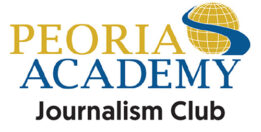 Continuing series on pending legislation: The Peoria Academy Middle School took a field trip to the Illinois State Capitol last May. During the visit to Springfield, students met with Rep. Travis Weaver. To prepare for the field trip, students were assigned an essay researching the complexities and implications of a pending bill sponsored by the Peoria Republican. The assignment required students to summarize the bill, describe its pros and cons, and then express their opinion. Here is the essay written by Emelia Stevenson, a Peoria Academy journalism student:
Continuing series on pending legislation: The Peoria Academy Middle School took a field trip to the Illinois State Capitol last May. During the visit to Springfield, students met with Rep. Travis Weaver. To prepare for the field trip, students were assigned an essay researching the complexities and implications of a pending bill sponsored by the Peoria Republican. The assignment required students to summarize the bill, describe its pros and cons, and then express their opinion. Here is the essay written by Emelia Stevenson, a Peoria Academy journalism student:
According to the 2022-2023 Illinois Association of Regional Superintendents of Schools “Educator Shortage Report,” 92% of the school districts in Illinois reported that substitute teacher shortages were a minor-to-very serious problem, and 48% of the districts in Illinois reported that the sub shortage is worse than in Fall, 2021.
In order to help with this problem, there has been a bill presented in the Illinois Legislature that would amend state School Code to only require a bachelor’s degree for a short-term substitute license. Applicants who have a bachelor’s degree from unaccredited institutions would be able to get a sub’s license under HB4311, which would help increase the number of substitute teachers in Illinois. But by passing this bill we are getting less qualified substitute teachers. Do we really want to trade quality for quantity?
There is a massive shortage of substitutes in Illinois as the percentages above show. If this bill passes, the number of substitute teachers would go up. This is helpful when there are not enough subs to teach. When we don’t have enough subs, teachers have to cover other teachers’ classes, even though they may not be the most qualified to teach that subject. It also forces teachers to come in when they are sick, which is not good for their health and well-being. When the teachers are not feeling their best, they do not teach their best, which means the students do not have an efficient and effective learning experience.
What is an unaccredited school? An unaccredited school includes colleges, trade schools, courses, or seminars that do not qualify for formal education accreditation. When employers see that someone went to an unaccredited school, it’s harder to know if that person went to a legitimate institution or a diploma mill. If it’s difficult for employers to tell whether the applicant went to a legit institution or a diploma mill, then it’s difficult to know if the subs hired from unaccredited schools are qualified for the job. How do we know they didn’t get their degree from a five-minute course they took from their second cousin in a basement? That’s the thing, we don’t know, and do we really want to be guessing on whether a person can teach the material to our kids?
Is the sub shortage really because potential subs went to an unaccredited school or is it that we pay substitute teachers very little money compared to the hours they work and the responsibility given them? Passing this bill doesn’t necessarily mean that we would get more subs.
Also, if most employers look down on applicants who have educations from an unaccredited school, how can we expect them to hire these applicants? I think passing this bill would not do much for the ongoing sub shortage in Illinois. Instead, we should be paying substitute teachers more and making them feel like valued members of the educational community.
In conclusion, the substitute teacher shortage in Illinois is a very important current issue. However, I don’t believe that this is the right way to fix the problem. I think that just expanding the requirements and lowering the standards is a quick and quite lazy solution. If this bill passes, I think you will find that our substitute teacher shortage didn’t really go away. I believe that the solution to this problem is to find out why we have a substitute shortage in the first place.
According to the substitute teachers I have asked, they don’t get paid enough for the hours they work and the responsibilities they have and they want to be more included in the education community. So instead of trading quality for quantity, we need to meet the standards of our substitute teachers as they meet our standards for them. Let’s stop with quick fixes that will fall apart later and take time to solve the problem now.
— Emelia Stevenson, Peoria Academy Journalism Club

Recent Comments